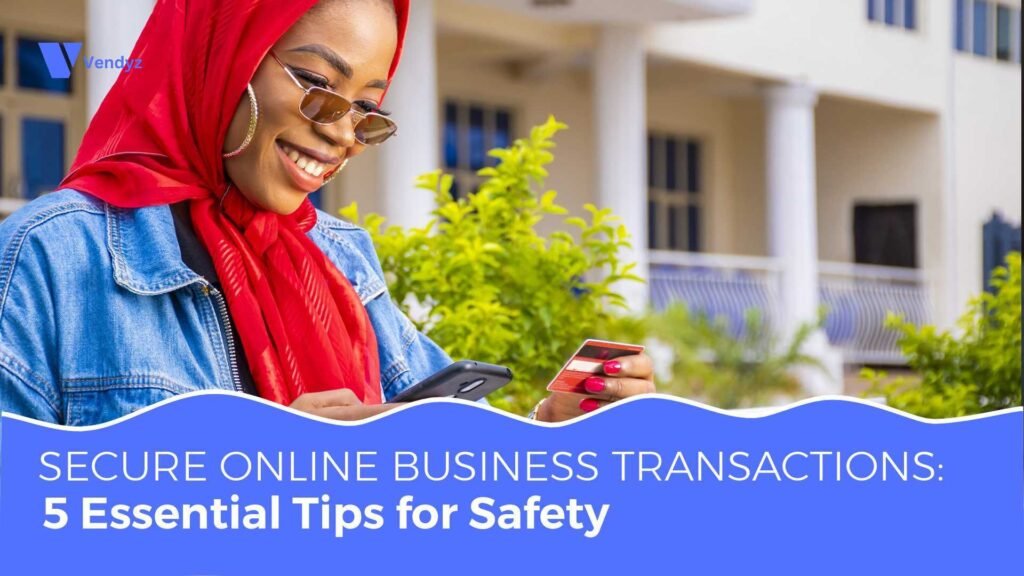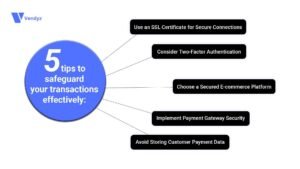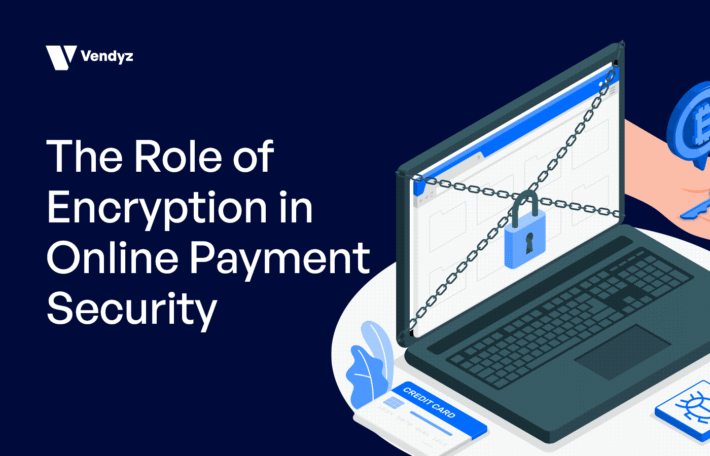Secure Online Business Transactions: 5 Essential Tips for Safety

5 Tips to Safeguard Your Online Business Transactions
In today’s digital landscape, ensuring secure online business transactions is paramount for any entrepreneur. As more people engage in online commerce, the risk of cyber threats increases. Implementing effective strategies to safeguard your transactions not only protects your business but also builds trust with your customers. Here are five essential tips to help you secure online business transactions effectively.
Here are five essential tips to safeguard your transactions effectively:
-
Use an SSL Certificate for Secure Connections
-
Consider Two-Factor Authentication
-
Choose a Secured E-commerce Platform
-
Implement Payment Gateway Security
-
Avoid Storing Customer Payment Data

1. Use an SSL Certificate for Secure Connections:
An SSL (Secure Socket Layer) certificate is a must-have for any online business. It is a technology that serves the function of encrypting the data that is exchanged between your website and your customers, ensuring that information, such as customer’s credit card details, is securely transmitted. SSL is one of the first steps to securing your business online.
To spot a website that is secured with SSL it displays “https://” in their URL and often shows a padlock icon in the address bar.
Why it matters:
One of the reasons why SSL certificate matters is that it doesn’t just protect your customer data but also goes a step further to boost your credibility. Customers are more likely to trust a site that with a “https://” attached to its URL than they would anyone that doesn’t, since it indicates a secure connection.
How to Implement:
Most web hosting providers like Hostinger, Hubspot, GoDaddy, Bluehsot etc, offer SSL certificates as part of their packages, ensuring that your website is configured correctly to display trust signals like security badges prominently on your site.
2. Consider Two-Factor Authentication (2FA):
Two-factor authentication (2FA) has proven to be a powerful too that adds an extra layer of security to your online transactions. By requiring two forms of verification– something you know (like a password) and something you have (like a smartphone) – you can significantly reduce the risk of unauthorized access.
Benefits of 2FA:
An outstanding benefit of using 2FA is that– If a hacker manages to obtain your password, they will still need access to the second factor which is often much harder to compromise. Therefore, it can secure online business transactions.
Implementation:
You should encourage your customers to enable 2FA on their accounts. You can also implement it for administrative access to your business accounts and social media accounts, ensuring that only authorized personnel can have access or make changes.
3. Choose a Secured E-commerce Platform:
As a business owner, when setting up your online store, choosing a reputable and secured e-commerce platform cannot be under emphasized. Ensure you prioritize choosing a platform that offers built-in security features such as: Fraud detection and prevention tools and Compliance with PCI DSS (Payment Card Industry Data Security Standard).
These features can help ensure that customers payment information is handled securely and reduces the likelihood of any sort of data breaches.
Popular E-commerce Platforms to explore:
Platforms like Shopify, WIX, WooCommerce and BigCommerce are house hold names know for having a robust security. Outside the following, ensure to read reviews and check security certifications before making your choice on which you would be setting your store on.
4. Implement Payment Gateway Security:
The lifeline of your online transaction is your payment gateway. It acts as the bridge between your website and the payment processor. As a business owner, you want to ensure that the payment gateway you are using is vital for protecting your customer data.
Key Features:
An ideal payment gateway would offer tokenization which replaces sensitive card information with a unique identifier or token during transactions. What this means is that even if data is intercepted, it cannot be used to carry out fraudulent activities.
Recommendations:
Several payment gateway like Vendyz, Flutterwave, Kora, and Paystack, prioritize providing strong security measures to its merchants, and are widely trusted by customers.
5. Avoid Storing Customer Payment Data:
Even if it is convenient to store customer payment information for future transactions, this practice can stand as an avenue to expose you to significant risks, especially if your database is compromised.
Instead of storing sensitive data, consider using a third-party payment processor that handles information securely without keeping it on your servers. This way, there will be minimum liability, and you would also enhance your customer’s trust.
Additional Security Practices
To ensure you are transacting online safely, here are some additional practices to implement:
– Create Strong Password: It is advisable for you and your customer to create or use strong passwords that combines both capital and small letters, numbers and symbols. Each password should be at least 12 characters long and must avoid easily guessed information like birthdays, anniversaries or common words.
– Implement Escrow payment options: By implementing escrow payment option transaction would not be completed until both parties are satisfied. This ensure that fraudulent online business transactions are intercepted promptly.
– Require Strong Passwords from Employees and Customers:
It is important to recommend to your employees and customers to use strong and complex passwords when signing up or making purchases on your site. You can go ahead to enforce this by making a policy that guides both customers and employees.
– Defend your Devices:
Ensure you regularly update your antivirus software and double check that your system is protected against malware and other threats. A secure Computer environment is essential for safe online transactions.
Conclusion:
By following these tips and best practices, you can create a safer environment for conducting online business transactions while building trust with your customers. Remember that maintaining security is an ongoing process that requires vigilance and regular updates to your security protocols. With these strategies in place, you can confidently navigate the world of e-commerce while safeguarding your business’s integrity and customer trust.Frequently Asked Questions
What other precautions can be used to ensure online transactions?
How can businesses ensure secure and trustworthy online transactions?



